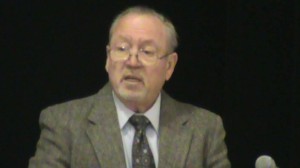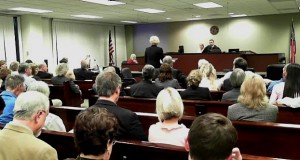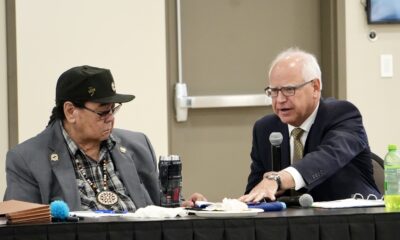Constitution
Health care reform bill re-argument

The New Jersey men suing against the health care reform bill will re-argue their case. To succeed, they need a new basis for bringing their case before the Supreme Court after that Court already denied certiorari. And they have found one: the Georgia Obama eligibility challenge.
The case against the health care reform bill

Nick Purpura, lead plaintiff, gives the invocation at a panel discussion on school choice, Franklin Williams Middle School, Jersey City, NJ. Photo: CNAV
The two plaintiffs, Nicholas E. Purpura and Donald R. Laster Jr, read the health care reform bill straight through more than a year ago. They found nineteen violations of the Constitution and of certain laws that the bill failed to mention. (A bill may always change an existing part of the United States Code. But it must do so by specifically amending that Code. Instead, the health care reform bill has language that conflicts with several sections of the Posse Comitatus Act, the Sherman Anti-trust Act, and Title VII of the Civil Rights Act.)
The count that today lets them re-argue their case (Purpura v. Sebelius, Docket No. 11-7275) is Count Six. It says that Barack H. Obama had no authority to sign the health care reform bill into law. The reason: he is not the President of the United States. And the reason for that is that he is not a natural-born citizen.
Purpura and Laster are not trying to challenge Obama’s birthplace, as Orly Taitz does. But they argue that being a natural-born citizen means more than being born in-country. It also means having two citizen parents. They cite Emerich de Vattel’s Law of Nations (1758), Book I, Chapter XIX, Paragraph 212.
The citizens are the members of the civil society; bound to this society by certain duties, and subject to its authority, they equally participate in its advantages. The natives, or natural-born citizens, are those born in the country, of parents who are citizens. As the society cannot exist and perpetuate itself otherwise than by the children of the citizens, those children naturally follow the condition of their fathers, and succeed to all their rights. The society is supposed to desire this, in consequence of what it owes to its own preservation; and it is presumed, as matter of course, that each citizen, on entering into society, reserves to his children the right of becoming members of it. The country of the fathers is therefore that of the children; and these become true citizens merely by their tacit consent. We shall soon see whether, on their coming to the years of discretion, they may renounce their right, and what they owe to the society in which they were born. I say, that, in order to be of the country, it is necessary that a person be born of a father who is a citizen; for, if he is born there of a foreigner, it will be only the place of his birth, and not his country.
Several Supreme Court precedents show that Vattel’s Law is in fact the American common law for federal cases. They include:
- Minor v. Happersett, 88 U.S. 162 (____) 21 Wall. 162 (1875)
- The Venus, 12 U.S. 8 Cranch 253 253 (1814)
- Perkins v. Elg, 307 U.S. 325 (1939)
The Minor case says this:
The Constitution does not in words say who shall be natural-born citizens. Resort must be had elsewhere to ascertain that. At common law, with the nomenclature of which the framers of the Constitution were familiar, it was never doubted that all children born in a country of parents who were its citizens became themselves, upon their birth, citizens also. These were natives or natural-born citizens, as distinguished from aliens or foreigners.
That common law is Vattel’s Law of Nations, not the body of English common law that most States use.
The Georgia Obama eligibility challenge

The Obama eligibility hearing before Judge Michael Malihi of the Georgia Office of State Administrative Hearings. Photo: The National Patriot; from a live video stream in the courtroom.
On January 9, the Supreme Court quietly denied certiorari to Purpura and Laster. They immediately vowed to re-argue their case, as is their right under the Supreme Court’s rules. But they knew that the Supreme Court was not likely to reconsider their denial unless they could give the Court new grounds to reconsider.
Those grounds came in the form of four lawsuits that various Georgia residents filed against Barack Obama, to enjoin the Georgia Secretary of State from listing Obama’s name on the ballot in the Democratic primary in that State. Those cases are:
- Farrar, Lax, Judy, Malaren, and Roth v. Obama (Orly Taitz, counsel) (Note: Cody Judy is challenging Obama’s ballot status because he wants to run for President himself.)
- Welden v. Obama (Van Irion of Liberty Legal Foundation, counsel)
- Swensen v. Obama (Rep. J. Mark Hatfield, counsel)
- Powell v. Obama (Rep. J. Mark Hatfield, counsel)
On January 5, Judge Michael Malihi of the Office of State Administrative Hearings set a hearing for all four cases on January 26. He denied Obama’s motion to dismiss, and ordered him to attend. He also allowed the attorneys to serve a subpoena on Obama to appear and to bring a hard-copy birth certificate with him.
Obama’s lawyer, Mark Jablonski, moved to quash the subpoena. Last week, Judge Malihi denied that motion, too. So Jablonski wrote to the Secretary of State and imperiously ordered him to cancel the hearing. Secretary of State Brian Kemp took no cognizance of the peremptory tone and politely said that the hearing would go forward. He also said that if Jablonski and Obama did not show,
…you do so at your own peril.
Neither Jablonski nor Obama showed. So Judge Malihi called an in camera conference. Several accounts say that the judge offered to recommend at once to Kemp that he strike Obama’s name from the ballot. All three lawyers urged the judge to let the hearing go forward in Obama’s absence and let them put their evidence on record. The judge allowed it.
The hearing took two hours. Taitz took up most of that time calling witnesses and testifying to her own grounds to suspect that:
- Obama’s PDF birth certificate is a forgery, and
- Obama might be using a false Social Security Number that first belonged to a long-dead man born in Connecticut in 1890.
Taitz moved to ask the Hawaiian courts to order Hawaiian officials to send a hard-copy birth certificate. Judge Malihi denied that motion, saying that he had no jurisdiction to make any such request of a court in another State.
But lawyer Irion presented the case most important to Purpura and Laster. He laid a case to challenge Obama’s parentage as disqualifying him as a natural-born citizen. He cited the Minor case as his prime authority.
Purpura and Laster re-argue
Technically Purpura and Laster have filed a motion to recall and vacate the earlier denial. The motion also asks for an expedited argument, and that the Court schedule Purpura and Laster to appear on the March 26 hearing date that the court set to hear argument on the massive Florida case.
Purpura and Laster say that the Obama eligibility issue is more important than any other single challenge to the health care reform bill. The reason, they say, is simple: primary elections have begun, and the Obama eligibility issue will be supremely important to this fall’s general elections. “Georgia is just the beginning,” the motion says. This is correct: four States (Georgia, New Hampshire, Alabama, and Illinois) have now seen challenges to Obama’s right to be on the ballot. Any of those cases would take too long to reach even its respective State Supreme Court. But the Purpura case could decide the Obama eligibility question now.
For that reason, Purpura and Laster argue that their case should take precedence over every other challenge to the health care reform bill.
It is incumbent upon this Court to settle the issue of ‘eligibility’ post haste to afford those in the Democrat Party an opportunity to choose an “eligible” candidate to be on the ballot in November. To do otherwise disenfranchises all voters and continues the constitutional crisis that has been escalating since the Courts refused to address Hillary Clinton’s 2008 Presidential campaign’s challenge.
Hillary Clinton’s campaign did challenge Obama’s natural-born citizen status in 2008. Not a single court decided that challenge on its merits; all ruled that the parties had no standing. (This begged the question of whether anyone has standing in a case like this.)
The motion lists all the fifteen counts against the health care reform bill. It calls particular attention to Count Six, the Obama eligibility count. It also reminds the Court of an earlier motion that Purpura and Laster filed: that Justices Elena Kagan and Sonia Sotomayor recuse themselves. Kagan served as Solicitor General while Congress drafted the health care reform bill. But more to the point, both Kagan and Sotomayor owe their appointments to Obama. If he is not eligible to sign the health care reform bill, then neither had he any authority to appoint them. Therefore, they cannot decide even on certiorari, because if the plaintiffs prevail, they are out of jobs.
The only thing that the government has argued thus far is that Purpura and Laster have no standing to object to the health care reform bill. They have never defended the bill on its merits. Should the Supreme Court say that the plaintiffs have standing, the case is forfeit and they win.
Purpura and Laster sent their motion today. The Court should receive it by Monday morning.
Related:
- Obama eligibility challenges explode
- Obama eligibility challenges go forward
- Certiorari denied
- Recusal issues
- Recusal motion 2
- Two cases
- Press release
- Challenge details
- Supreme challenge
- Privacy violations
- Setback
- Opposition brief
- Revised motion
- Legal confusion
- Frustration
- More motions
- Recusal motion
- Default motion
- Appeal skirmish
- Commerce, health care, and distortion
- Plaintiffs seek injunction
- Appeal delayed
- Plaintiffs have standing after all
- DOJ wants more time on HCR appeal
- Another appeal
- Hazardous to your health
- Court dismissal
[subscribe2]
Terry A. Hurlbut has been a student of politics, philosophy, and science for more than 35 years. He is a graduate of Yale College and has served as a physician-level laboratory administrator in a 250-bed community hospital. He also is a serious student of the Bible, is conversant in its two primary original languages, and has followed the creation-science movement closely since 1993.
-

 Education5 days ago
Education5 days agoFree Speech Isn’t Free and It Cost Charlie Kirk Everything
-

 Civilization5 days ago
Civilization5 days agoThe Campaign Against ICE Is All About Open Borders
-

 Executive5 days ago
Executive5 days agoWaste of the Day: U.S.-Funded International Groups Don’t Have to Report Fraud
-

 Civilization2 days ago
Civilization2 days agoHow Republicans Can Make DFL Pay for Fraud Scandal
-

 Executive4 days ago
Executive4 days agoWaste of the Day: Throwback Thursday – Monkeys Throw Poop, And $600K
-

 Civilization4 days ago
Civilization4 days agoThe Battle for the Arctic Runs Through Greenland
-

 Civilization3 days ago
Civilization3 days agoBreaking Away From the Pack: The Case for the Acquisition of Greenland
-

 Civilization22 hours ago
Civilization22 hours agoTranquility Is a Drama Trump Can Win



I asked you this once before, but you didn’t answer. Where is Minor v. Happersett or Perkins v. Elg does it mention Vattel anywhere in the case?
James F
It doesn’t exist just like they cannot answer my request for a modern law dictionary that uses Vattels’s definition of Citizen.
Terry does not do any research for these discussions he just throws out unfounded opinions and interpretations. The readers performs the research that debunks his position and he will not acknowledge you are correct or just continues to dispute with no back up.
It doesn’t matter whether Minor v Happersett is in the pleadings or Vattel or Joe Blow, they are not going to get a re-hearing and are not going to be allowed to argue in March.
The Administrative Hearing in GA means zip as relates to Purpura, et al. v Sebelius.
They have been set for distribution on 2/17. You can check the orders after about 1:00 on Friday afternoon and you’ll find their request was not granted. On Monday you can check and see it was denied, if you don’t believe Friday’s list.
[…] Health care reform bill re-argument […]
The outcome is:
link to supremecourt.gov
Dec 15 2011 DISTRIBUTED for Conference of January 6, 2012.
Jan 9 2012 Petition DENIED.
Jan 16 2012 Petition for Rehearing filed.
Feb 1 2012 DISTRIBUTED for Conference of February 17, 2012.
Feb 21 2012 Rehearing DENIED
[…] Re-argument […]